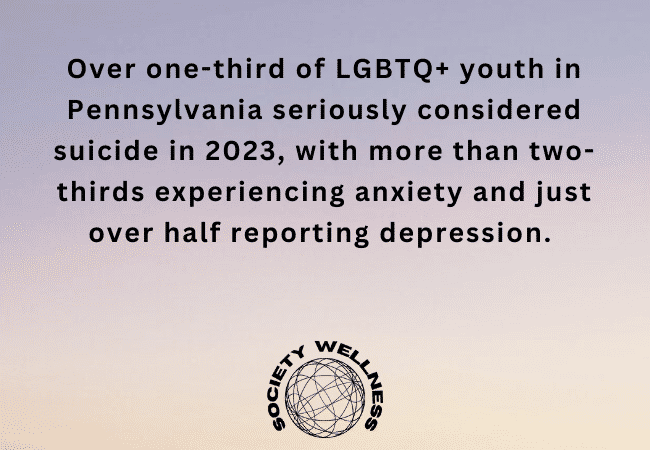Discrimination, stigma, and marginalization are all too common experiences for members of the LGBTQ community. Whether it’s the trauma of being bullied at school, facing rejection from loved ones, or feeling invisible in healthcare spaces, the impact on mental health is profound. But healing is possible—and LGBTQ-affirming therapy is one of the most powerful tools available to reclaim confidence, identity, and well-being.
LGBTQ therapy in Massachusetts provides not only clinical support but also a space where queer and trans individuals are deeply understood and celebrated. Through individual sessions, group programs, and targeted mental health services like the LGBTQ Anxiety Treatment Program in Massachusetts or the LGBTQ Depression Treatment Program in Massachusetts, clients build resilience and heal from the scars of social rejection.
In this blog, we’ll explore how LGBTQ therapy helps overcome stigma, what options are available in Massachusetts, and how community-based care fosters lifelong mental and emotional wellness.
Understanding Discrimination and Its Psychological Toll
Despite major advances in legal protections and visibility, many LGBTQ people continue to experience discrimination in both subtle and overt ways. These experiences are not just harmful in the moment—they accumulate over time and can result in complex psychological wounds.
Types of Discrimination LGBTQ People Face:
- Institutional Discrimination: Unequal access to healthcare, housing, employment, and legal protection.
- Interpersonal Stigma: Harassment, bullying, name-calling, social exclusion.
- Internalized Homophobia/Transphobia: Adopting society’s negative beliefs and turning them inward.
- Medical Trauma: Misgendering, denial of care, or judgment in healthcare settings.
The cumulative effect of these experiences is called minority stress, and it significantly raises the risk of:
- Depression and suicidal ideation
- Anxiety and panic disorders
- Substance use and addiction
- Trauma-related disorders, including PTSD
- Self-harm and emotional dysregulation
That’s why access to culturally responsive care through a trusted LGBTQ Behavioral Health Center in Massachusetts is critical.
How LGBTQ Therapy Supports Healing and Resilience
LGBTQ therapy is not one-size-fits-all. It adapts to the individual’s identity, history, and mental health goals—offering a combination of affirmation, accountability, and emotional safety.
1. Identity Affirmation
Therapists trained in queer and trans care provide a nonjudgmental environment where clients can:
- Explore and affirm their gender identity or sexual orientation
- Discuss coming out, transition, or chosen family without fear
- Address internalized shame or religious trauma
This is the foundation of services like Queer therapy Massachusetts, which supports exploration of identity in inclusive and expansive ways.
2. Addressing and Processing Trauma
Many LGBTQ individuals experience trauma that is directly tied to their identity. LGBTQ therapy helps process this trauma through:
- Narrative therapy that reframes painful experiences
- EMDR or somatic therapies that target body-held trauma
- Safety planning and trust rebuilding
- Group sessions with others who’ve faced similar harm
This work is central to the LGBTQ Trauma Treatment Program in Massachusetts, which offers deep, structured support for complex trauma.
3. Building Coping Tools for Discrimination
Discrimination can’t always be prevented—but therapy teaches tools to handle it in healthier ways:
- Boundary setting and assertiveness
- Emotional regulation through DBT or CBT
- Self-care routines to counteract dysphoria or distress
- Challenging toxic narratives with cognitive restructuring
Programs like the LGBTQ Anxiety Treatment Program in Massachusetts help clients manage triggers and reduce fear-based responses.
4. Repairing Relationships and Building New Ones
Stigma often damages interpersonal relationships—whether with family, romantic partners, or oneself. Therapy helps rebuild trust and connection.
For couples, LGBTQ couples therapy Massachusetts and LGBTQ couples counseling Massachusetts provide tools to:
- Communicate across identity-based misunderstandings
- Resolve conflict without shame
- Explore non-monogamy or open relationships safely
- Process external stressors (e.g., family rejection, workplace discrimination)
Evening outpatient therapy offers ongoing relationship support through the LGBTQ Evening Outpatient in Massachusetts for couples with work or caregiving responsibilities.
5. Accessing Structured, Identity-Affirming Mental Health Programs
Depending on the level of need, clients may enter clinical treatment through:
- LGBTQ Partial Hospitalization Program Massachusetts (PHP): Full-day care for acute mental health needs.
- LGBTQ Intensive Outpatient Program Massachusetts (IOP): Several sessions per week for clients stepping down from PHP or needing more support than weekly therapy.
- LGBTQ Evening Outpatient: Flexible care for those managing work, school, or family commitments.
Each level of care integrates clinical support with identity-centered therapeutic environments where clients can show up fully, without needing to explain who they are.

The Role of Community in LGBTQ Therapy
Therapy doesn’t happen in a vacuum. For many queer and trans people, healing also requires connection—especially when stigma and discrimination have led to isolation or fractured relationships.
How Community-Based Therapy Enhances Healing
- Reduces feelings of isolation: Being in therapy with other LGBTQ individuals reinforces the message that you’re not alone in your struggles.
- Fosters belonging: LGBTQ support groups and workshops help clients find chosen family and rebuild trust in community.
- Provides accountability: Peer settings offer a level of support and honesty that complements individual therapy.
- Models affirming communication: Group spaces can model how to speak about identity with pride and vulnerability.
This is a core part of many LGBTQ Mental Health Programs in Massachusetts, where group therapy is combined with clinical care.
Examples of Community Offerings:
- LGBTQ processing groups for grief, trauma, or identity
- Peer-led mental health workshops
- Support circles for trans individuals navigating transition
- Queer-led creative or mindfulness groups
Healing doesn’t just happen in the therapist’s office. It happens when clients see that their story is shared, valued, and honored by others.
Condition-Specific Programs: Therapy That Meets You Where You Are
LGBTQ Depression Treatment Program in Massachusetts
- Behavioral activation and skill-building
- Therapy to challenge negative self-perception
- Reconnection with identity, values, and purpose
- Use of medication support when appropriate
LGBTQ Bipolar Treatment Program in Massachusetts
- Mood stabilization in an affirming clinical setting
- Exploration of how mood changes impact relationships and identity
- Group support focused on long-term recovery and self-awareness
LGBTQ Anxiety Treatment Program in Massachusetts
- Individual and group CBT
- DBT skills for emotion regulation
- Safe exposure therapy for social or generalized anxiety
- Self-empowerment tools for navigating public life safely
Conclusion
Discrimination may be a daily reality—but it doesn’t have to define you. LGBTQ therapy gives you the tools to unlearn shame, process trauma, and live proudly. Whether you’re healing from family rejection, navigating life transitions, or managing a mental health condition, therapy offers a path forward grounded in safety, respect, and celebration of who you are.
Call LGBTQ Behavioral Health at 888.964.8116 today to connect with affirming therapists and explore a program tailored to your needs—from Queer therapy to LGBTQ PHP and IOP programs in Massachusetts.
FAQ on LGBTQ Therapy for Discrimination and Mental Health
Why is LGBTQ-specific therapy important for mental health?
LGBTQ therapy provides a safe, affirming space for individuals to explore their identity, heal from stigma, and address emotional challenges like anxiety, depression, and trauma. Unlike traditional therapy, LGBTQ-specific care centers the unique lived experiences of queer and trans individuals.
How does LGBTQ therapy help with discrimination and stigma?
Therapy helps individuals identify the impact of external discrimination and internalized stigma, build coping strategies, and develop self-acceptance. LGBTQ therapists are trained to provide culturally competent care that validates identity and affirms resilience.
What mental health services are available for LGBTQ individuals in Massachusetts?
Massachusetts offers a wide range of affirming mental health services, including:
-
LGBTQ Couples Therapy & Counseling
-
Queer Therapy
-
LGBTQ Partial Hospitalization Program (PHP)
-
LGBTQ Intensive Outpatient Program (IOP)
-
LGBTQ Evening Outpatient Therapy
-
Anxiety, Trauma, Depression, and Bipolar Treatment Programs
What is the difference between LGBTQ PHP and IOP programs?
-
PHP (Partial Hospitalization Program): Full-day intensive treatment for individuals in acute mental health distress who don’t require overnight care.
-
IOP (Intensive Outpatient Program): Structured part-time care several days per week, ideal for those transitioning from inpatient care or needing more than once-a-week therapy.
Both offer LGBTQ-affirming therapeutic environments and multidisciplinary support.
How can LGBTQ couples benefit from counseling?
LGBTQ couples therapy in Massachusetts helps partners navigate identity-specific challenges, enhance communication, rebuild trust, and explore relationship dynamics such as polyamory, coming out, or family rejection—always within an affirming and safe environment.
Is community an important part of LGBTQ therapy?
Yes. Group therapy and peer support foster a sense of belonging, reduce isolation, and offer a space to share experiences with others who understand. Many Massachusetts programs offer group-based care to help clients feel seen and supported.

